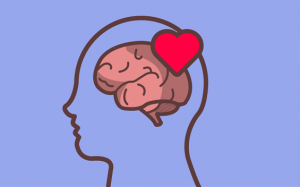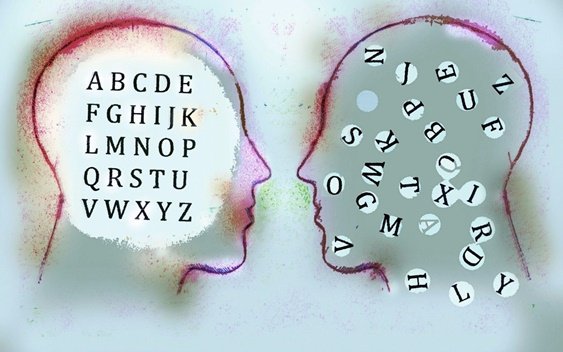Emotional Illiteracy: When Your Brain Has No Heart


Written and verified by the psychologist Valeria Sabater
So many people suffer from emotional illiteracy. They may have all kinds of other skills and plenty of titles and degrees, but they have the emotional processing ability of a three-year-old. It’s the kind of thing you can’t just learn from a textbook. And whether we like it or not, it’s an issue we’ve neglected.
Most of us know about the main principles for good physical health, things like a balanced diet with as much natural food as possible, exercise, sleeping 7 to 9 hours every night, and getting occasional check-ups to make sure we’re doing alright.
“When you listen with empathy to another person, you give that person psychological air.”
-Stephen R. Covey-
But if there’s one thing we neglect way too much it’s this thing between our ears: our brain. But we’re not talking about the physical part of it with ridges and nerve cells.
What we’re talking about is our emotional health: our ability to feel out life and our relationships. We need to focus more on checking on how we’re doing with our ability to understand, control, and change our moods, and other people’s too.
Human beings are much more than just a bunch of linguistic, mathematical, or technical skills. We are, above all else, social and emotional creatures. This is something that we forget most of the time, and most educational institutions do not see it as important.
But let’s admit it, knowing how to solve a problem with the quadratic equation won’t do much for you if you can’t even communicate effectively or empathize with the people around you, for example.

What is emotional illiteracy?
We all know that the word “illiteracy” has a negative connotation. But we have no other word to use for this extremely obvious psychosocial reality. We’ll give you an example. Nowadays people talk a lot about the idea of leaders who bring radical change.
They’re the kinds of people who can make an organization more dynamic thanks to their high emotional intelligence, motivation, and knack for leaving their mark on other people and fostering spaces where people can be creative.
The idea may be so popular just because it’s been missing for so long. Useless business leaders are widespread, not just because they can’t inspire people, but because they also have no ability to control their emotions. They’re like toddlers throwing tantrums because they didn’t get what they want. They’re a perfect example of what Piaget defined as selfish thinking.
Characteristics of emotional illiteracy
Let’s look at some of the things that define it:
- An inability to understand and manage one’s own emotions.
- Trouble understanding other people’s emotions.
- Their lack of emotional self-awareness usually makes them very sensitive. They overreact to just about any problem and feel exhausted or overwhelmed by any challenge, no matter how big or small.
- They don’t empathize. They’re incapable of putting themselves in other people’s shoes.
- They have very rigid social skills. While they can be developed, they have no sensitivity, assertiveness, or the intimacy you need to for meaningful, unselfish relationships.
- On top of all this, emotional illiteracy can have huge costs: black and white thinking, repression, racism or sexism, narcissism, an obsessive need to be right…

There’s also another important fact worth remembering. Emotional illiteracy — not having the psychological resources and emotional tools you need to deal with things like sadness, anger, or disappointment — will almost always make you more vulnerable to mental disorders.
That’s why things like depression and chronic anxiety are very common in people with little to no emotional processing skills.
The importance of teaching emotional intelligence
You’ve probably read books about it or taken classes on it. And you probably nod your head every time someone talks about how important emotional intelligence is.
But there are still huge gaps. That’s why, even though some schools are now making it an objective, there’s one equally, or maybe more important thing we can’t forget about. Before teachers start educating children about their thoughts and emotions, they need skills themselves.
“Your intellect may be confused, but your emotions will never lie to you.”
-Roger Ebert-
So many of us get to adulthood carrying a lot of insecurity. We wake up every day knowing that we’re lacking tools to deal with our emotions and hardship. Thus, if you don’t start by thinking about your own emotional illiteracy, you probably won’t have any luck motivating your kids. But you’ll have to work on it. That is, if you want to teach them about the empathy, assertiveness, and social skills they’ll need later in life.

The benefits of emotional literacy
A good level of “emotional literacy” has a ton of benefits. One thing you’ll learn right away is that every emotion has a place and a purpose. You’ll learn that distinguishing “negative” emotions from “positive” ones isn’t always the right way.
Actually, emotions we try to avoid, like sadness or disappointment, have a proper place, purpose, and meaning. So don’t run away from your emotions. Instead, face up to them so that you’ll know what they’re trying to tell you. It’s a wonderful kind of self-awareness that will give you strength and a much broader, flexible outlook on life.
No more postponing your emotional homework!
This text is provided for informational purposes only and does not replace consultation with a professional. If in doubt, consult your specialist.








